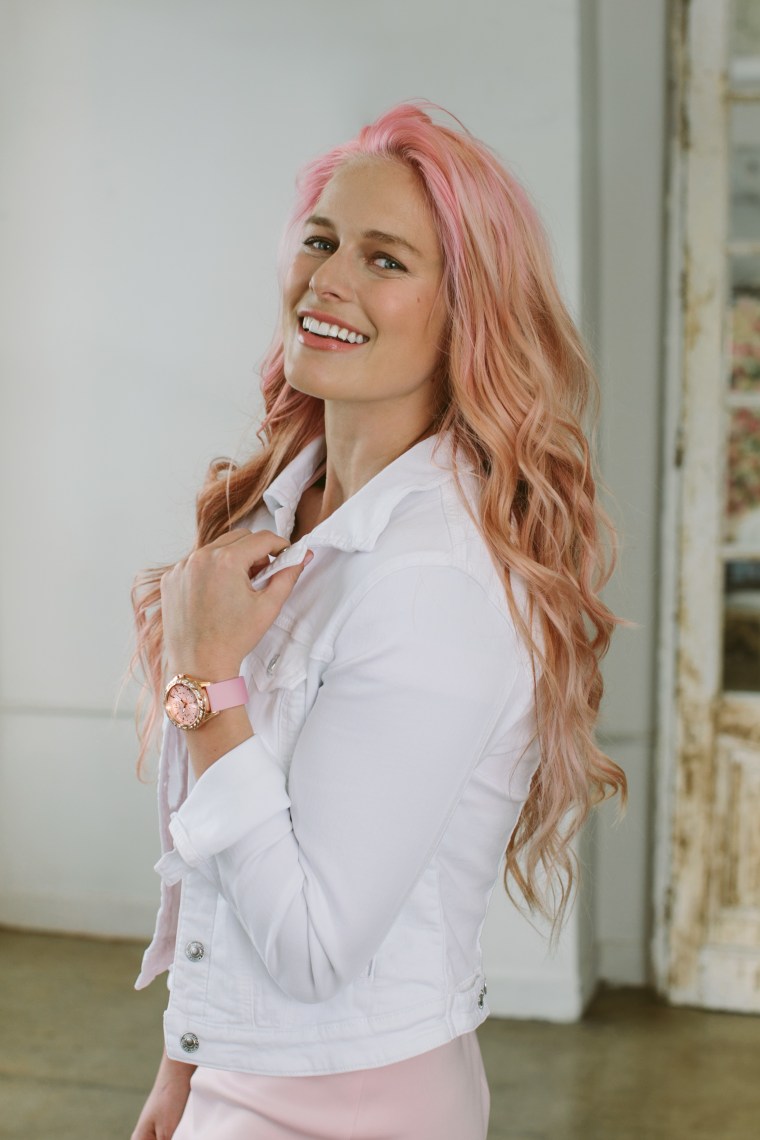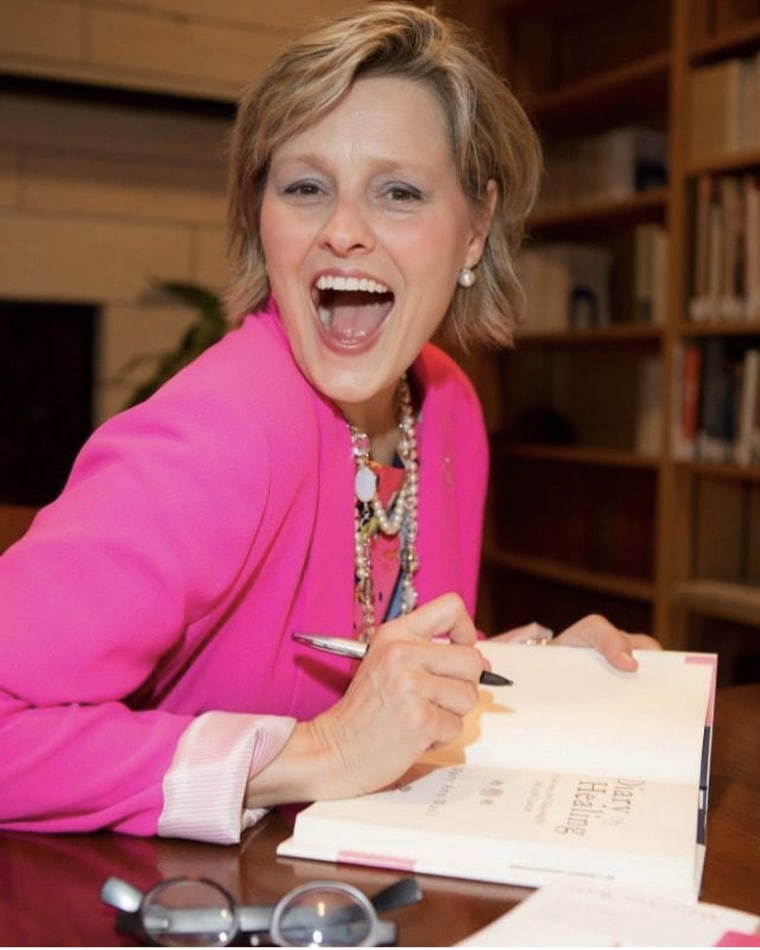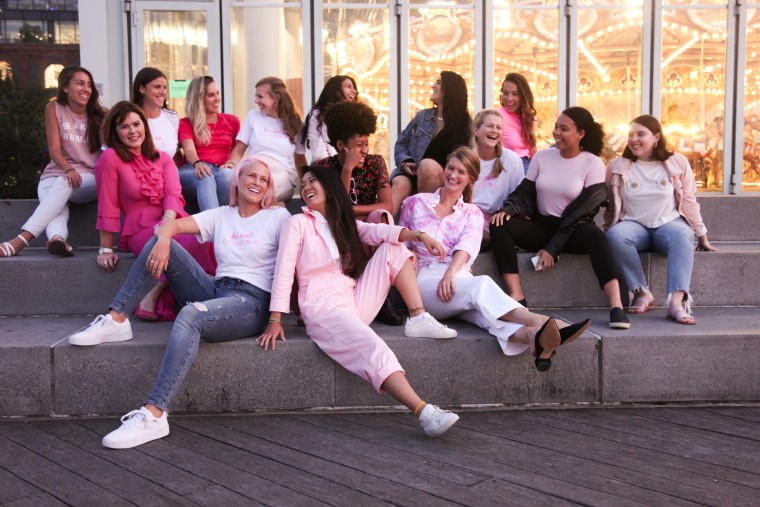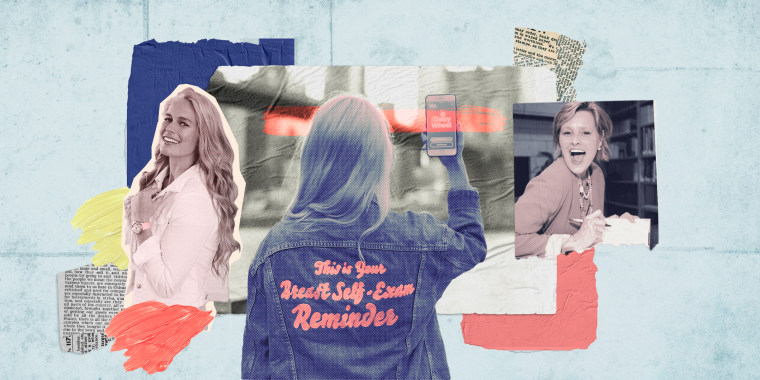If you were lucky enough to know Mary Ann Wasil, then you were better for it. She left a legacy when she passed away from breast cancer in 2016 as the founder of the global nonprofit, The Get In Touch Foundation. Her daughter, Betsy Nilan, 29, is now at the helm of this organization and taking it to new heights. They are reaching thousands of young women around the world through a new smartphone app, educator support guide and promotion of the "Daisy Wheel" self-exam method. Below, Nilan explains how the method works and the future of the organization.
TMRW: What is the Get In Touch Foundation and what inspired you to be able to take the reins as president of the organization?
The Get In Touch Foundation is a global breast health nonprofit organization. We are a passionate team specifically focused on providing free and accessible information, empowering all to make breast health simple, appropriate and routine. So not to be confused with other breast cancer nonprofit organizations, we focus solely on educating the importance of how to do a breast self-exam.

The organization started back in 2008 after my mom, Mary Ann Wasil, received a breast cancer diagnosis. My mom had actually incorporated self-breast exams into her normal health routine. Then one day, she found a lump on her breast when she was doing a breast self-exam. She went to the doctor and he was very dismissive. He said, “Don't worry about it, come back in a year, it's probably nothing.” She went to a different doctor and found out that she had breast cancer in both breasts and quickly realized that due to her self-exams and knowing her body, she had saved her life because she knew her body better than anyone else.
When my mom had a recurrence in 2012, I was getting my master's degree at Southern Connecticut State University and I was working part time with the organization as the administrative assistant. Then my mom got really sick and so I started slowly taking on her role. At that point, the board of directors asked me to step in as president. It was tough because I couldn't separate my work life and my personal life. Both were so intertwined, so there was no time for grieving. When my mom passed away, there was still so much work to do. That was the really tough part. I was always thinking of my mom or going through pictures of my mom but as time went on and what used to make me become very emotional and even cry, now makes me smile. Someone once told me that one day I would wake up and instead of crying when I see a picture of her, I would smile. And that happened one day. She would be so proud to see where GIT is today, taking it into the 21st century and moving more into the digital space in order to bring more millennials into this conversation of breast health outside of schools. So, it's really special. I'm just really proud to be in this position and take over her work and her life-giving mission and legacy.
What is the Daisy Wheel app and the digital educator’s toolkit?
My mom taught me how to do a breast self-exam. Realizing that there was a demand for that information, she teamed up with a bunch of different medical professionals, such as oncology nurses, a breast surgeon and a pediatrician, and she invented the Daisy Wheel (method). It includes the eight steps on how to do a breast self-exam. We started our Daisy Wheel program 10 years ago and, at that point, it was our paper program. We've continued to innovate and improve the different technologies around the Daisy Wheel as the years have passed and we have brought it into the 21st century with the Daisy Wheel app. The app is the easiest way to make breast self-exam reminders.
We have now made breast health education more accessible to all through our new online digital toolkit. The educator’s digital tool kit includes various resources for all different audiences — you can pick and choose which slides to present to your class. Whether a small 5th grade class, a distance-learning high school health class on Zoom, an October breast health awareness class or puberty and hygiene lessons with middle schoolers. We wanted to make sure everyone had access to this information if their school nurse or health educator hadn't heard of us or weren't able to teach it. If students are not getting this information in school, we want to make sure that access on the student’s own terms is easily available. Our educator’s digital toolkit was launched as a response to COVID-19. If the health educators were uncomfortable with technology, we supported them with a PowerPoint presentation. There is information on our Daisy Wheel app, how to get involved, etc., and it basically has everything.
I know that “choose joy” was one of your mom's life mantras. How do you continue to “choose joy” everyday?

Being a witness to my mom’s experience and what she went through with her diagnosis and her recurrence, I honestly don't know how she managed to choose joy everyday, but she did. Her attitude made me think, “What am I complaining about?” I know life gets really hard, but it just really puts things in perspective. I think even during the recent times of COVID, I especially heard her words, “choose joy,” because there's nothing I can do about what's happening outside my apartment, and why would I? Why am I going to waste a single second being unhappy about things I can't control? I'm just going to be happy. I deal with it. So, it's tough sometimes. When there is an especially rough day, I find some small thing to be happy about, like my cup of coffee with a doughnut in the morning. Yeah, just keep it really simple. I think about her struggles and I remember her lessons.
Why do you think people feel uncomfortable when talking about getting in touch with your body or performing a self-breast exam?
I think part of the problem is that breast exams aren’t routine, so they don't feel supernatural or normal! The majority of young people do not make it a routine every month. When I was just 13 years old, I learned how to do my first breast exam. I didn't really have time to question it. My mother had breast cancer and she told me that I have to do this routinely like brushing my teeth. I still brush my teeth when I wake up and before I go to bed and I don't really question why, I just do it. It's the same with breast exams.
I do that once a month, the week after my period, and I have a calendar reminder with the Daisy Wheel app. But there is a lot of stigma around women's bodies and especially with how they feel about their bodies. Are they confident? I know that when I was 13, I was very flat chested. I remember my mom walked me through how to do a breast exam and I was in my training bra. That was so long ago and very uncomfortable. I was embarrassed about my growing breasts. I couldn't even say the word! It was hard for me to talk about breast cancer at age 13. It took time and I eventually was able to make the breast exams routine, get more comfortable and get more confident.
We actually heard from a girl once who said she didn't do breast exams because she hated her body. This was a huge eye opener that there are much deeper issues besides access to this education. Women have to be comfortable with their bodies. So that is an added layer. So we created the Daisy Wheel app last year and you can get a reminder every month to make a routine. Even if you miss a month, at least you're doing a breast self-exam more often than you were before. That's just one thing I've been really proud of over this last year.

What do you want to share with other young women who are looking to be president/CEO of their own dream organization or business?
Be yourself and build off of that! When I stepped into this role, I did not feel like (a boss) at all. I definitely struggled with my identity and figuring out what I wanted to do and what my role with this organization really looked like. I believe just truly being myself was the answer. It sounds so easy and simple, but it was actually really hard. I remember the first few months of working as president, I would go to all these different meetings and I would wear a black suit and black high heels. I was nervous about people taking me seriously. Then I was like, forget it, I'm going be myself and I will wear a denim jacket that says, "This is your breast health reminder" and I'm going to wear pink, sparkly shoes and I'm going to embrace my pink hair. I think once I accepted these strengths, I just felt so confident. Lean into who you really are!
What are your goals for Get In Touch for the rest of 2020 and beyond?
Our goal for the rest of 2020 is to reach 10,000 downloads on our Daisy Wheel App. Then moving forward, our goals for the future would be to reach 100,000 downloads. At some point, we want to be a household name for breast health education. We want people to come to us when they are looking for anything having to do with breast health. We want to make sure that every student knows about the Daisy Wheel and knows about Get In Touch.
What can readers do if they want to help your mission?
They can visit our website at www.Getintouchfoundation.org to learn more about our work, our tools, or make a donation. We also encourage everyone to download the Daisy Wheel app to check us out!


